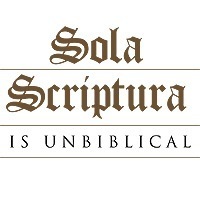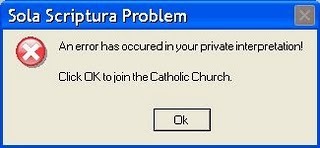Books by Dave Armstrong: 150 Biblical Arguments Against Sola Scriptura

[I recently signed a book contract with Catholic Answers, dated 7-12-11; probably to be published in Fall 2011. Currently being edited by Todd Aglialoro: editor of The Catholic Verses and The One-Minute Apologist: 122 pages. The outline below is not necessarily the final one; it is my own initial proposed structure, in close consultation with Todd. Even the title of the book could possibly change. The contract reads, "working title."]
TABLE OF CONTENTS
Dedication
Introduction
1. The Binding Authority of Tradition
A. Biblical and Apostolic Tradition Contrasted with the False and Corrupt Traditions of Men (1-12)
1. The Basic Biblical Data on Sacred Tradition
2. Good (Apostolic) Tradition vs. Bad Traditions of Men [read very similar excerpt online]
3. St. Peter's Apostolic Authority in Acts 2
4. Unchangeable True, Apostolic Tradition in the Bible
5. Tradition is Inevitable (and a Fact) for All Christians
6. "Biblical," "Unbiblical," "Extra-Biblical," Etc.
7. Covenants and Sacred Tradition are Perpetually Binding
8. Apostolic Tradition is in Harmony with Holy Scripture
9. Authoritative Interpretation of the Law in Ancient Israel
10. Infallible Nature of Pauline Tradition Taken for Granted
11. "Commandment" and "Command" as Synonyms for Tradition
12. Apostolic and Pauline Tradition Binding Even if Unwritten
B. Oral and Deuterocanonical Tradition (13-21)
13. Authoritative New Testament Citations of Traditions Not Present or Spelled Out in the Old Testament
14. Informal Divine and Apostolic Discussions and their Relation to Tradition and Scripture
15. No Biblical Indication that Oral Tradition Was to Cease
16. Massive and Habitual New Testament Quotation of Deuterocanonical Books
17. Competing Schools in Judaism and Denominations in Protestantism
18. Prophetic and Divine Truth Alongside Written Scripture
19. Inscripturation Not the Final Determinant of Binding Truthfulness
20. Oral Tradition is Wider in Scope than Written Scripture
21. Authoritative Oral Tradition in the New Testament
C. Continuing Christian Adherence to Jewish (Pharisaical) Tradition and Mosaic Law (22-35)
22. Jesus Didn't Overturn or Reject the Mosaic Law
23. "Moses' Seat" as an Example of Extrabiblical Tradition Sanctioned by Our Lord Jesus
24. St. Paul's Self-Identification as a Pharisee After His Christian Conversion and its Implication for the Nature of Tradition
25. St. Paul's Continued Worship at Synagogues
26. St. Paul's Acknowledgment of the Authority of the Jewish High Priest Ananias, Even at His Trial
27. Jesus Continued to Participate in the Old Testament Sacrificial System
28. Jesus Followed the Pharisaical Tradition
29. Jews Called "Brethren" and "Fathers" by Christians
30. If the Galatians Were Hypocrites, Why Not Pharisees Also?
31. St. John: Caiaphas the High Priest "Prophesied"
32. Christianity's Adoption of Late Pharisaical Traditions and Doctrines
33. Sadducees: the "Liberals" and "Sola Scriptura Advocates" of Their Time
34. Continuing Christian Temple Worship and Participation in Sacrifices
35. Ancient Judaism is Analogous to, and Was Organically Developed by Catholicism, Not Protestantism
D. Prophecy and Proclamation: "Word of God" and "Word of the Lord" (36-42)
36. Unrecorded Prophecies from Inspired Prophets
37. Oral Prophecies Possessed Divine Authority
38. "Word of the Lord": Not Usually a Reference to Scripture
39. Prophecy as a Continuing New Testament Charism and Phenomenon
40. Tradition and Scripture Both Derive from the Larger Category of "Word of God"
41. St. Paul's Frequent Recourse to Tradition and Relatively Rare Reference to Scripture in his Epistles to the Thessalonians
42. Oral "Word of God" in the New Testament
E. Perspicuity (Clearness) of Scripture and the Necessity of Authoritative Interpretation (43-61)
43. "Desert Island" Minimalistic Christianity Not the Biblical Norm
44. Are Individuals Wiser Bible Interpreters Than the Corporate, Historical Church?
45. Bible Not Utterly Mysterious According to Catholicism
46. False Assumptions Can Lead Biblical Exegetes Astray
47. The Bible Teaches that it Can be Misinterpreted
48. Clear but Unclear?: Perspicuity and Denominationalism are at Odds
49. Conflicting Protestant Ways to Harmonize and Systematize "Plain" Scripture
50. The Bible Teaches that Biblical Interpretation is Inherently Necessary
51. The Church Authoritatively Declares Biblical Doctrine
52. Jesus Reveals Hidden Scriptures to the Disciples at Emmaus
53. Bible Familiarity with False Assumptions Leads to Heresy
54. The Protestant "Ignorance" Rationalization Utilized to Explain Puzzling Doctrinal Diversity
55. The Bible Never Lists its "Essential" Teachings / The Protestant "Sin" Rationalization
56. The Bible Asserts that Not All of its Teachings are Obvious
57. Things Difficult to Understand in John 6 and the Gospels
58. Authoritative Teaching Authority in the Old Covenant
59. Luther's "Scripture and Plain Reason" Turned Back on Him
60. Mere Bible Memorization vs. Understanding in the Light of Context and Historical Interpretation
61. Protestants Have Authority Structures, but Contradicting "Authoritative" Teachings Abound
F. General or Miscellaneous Arguments Relating to Sola Scriptura (62-82)
62. The Bible Never Teaches That Oral Tradition Would Cease and Sola Scriptura Become the New Rule of Faith
63. Apostles Unaware that Their Epistles are Inspired Scripture (Thus the Necessity to Otherwise Determine Canonicity)
64. Material vs. Formal Sufficiency of Holy Scripture
65. Use of Scripture in Argument and Proofs is Not the Equivalent of Sola Scriptura
66. All Catholic Doctrines are Harmonious with Scripture and Present at Least Implicitly or by Deduction
67. The Nature of Sola Scriptura Necessarily Involves Establishing it from the Bible Itself
68. Councils and Constant Tradition Can Err but Luther Cannot When He Opposes Them?
69. Luther's and Calvin's Starting Principle Doesn't Preclude Endless New Denominations
70. Scripture Alone May be Sufficient for Much and Many, but Not for All
71. Trinitarianism is Clear in Scripture, Nevertheless Heretics Don't See It, Divorced from Orthodox Historical Interpretation
72. Luther Arbitrarily Assumed Profound Authority, Rather Than Proving that He Possessed It
73. Protestants are Radically "Unhistorical" When it Suits their Purposes, Yet Appeal to History in Other Instances
74. Sola Scriptura Isn't Dead Wrong, so Much as it is Incomplete and Skeletal
75. Vicious Internal Contradictions Always Present in Protestantism
76. The Church Fathers Reject Sola Scriptura Even if They Differ Somewhat on the Nature of Tradition
77. Anabaptists Simply Followed Luther's Logic and Dissented from Him, Yet Luther and Calvin Persecuted Them
78. Church and Scripture Not a Zero-Sum Game (False Protestant Dichotomies)
79. Protestants are Also Limited in How Far They are Allowed to Stray from Denominational Creeds and Confessions
80. Inconsistencies in the Protestant Revolt Against Catholicism and Previous Christian Tradition
81. St. Paul in Ephesians 4 Shows Little Consciousness of a Supposed Sola Scriptura Rule of Faith
82. St. Paul's Greater Relative Use of Tradition and Church Motifs Over Against Use of "Scripture" and "Word of God," Etc. [read very similar excerpt online]

2 The Binding Authority of the Church
A. New Testament Evidences for a Hierarchical, Visible Church With Strong Authority (83-98)
83. Bishops Have Authority Over Elders (Priests) in the Bible
84. Priestly "Binding and Loosing" in Holy Scripture
85. The Universal, Visible, Hierarchical Church in the Bible
86. Church Authority as Explicated in Holy Scripture
87. Anathema and Excommunication are Biblical Concepts
88. The "Invisible Church" is an Ethereal Pipe Dream
89. "Problems" in Church History are as Non-Fatal as Exegetical "Problems" to be Solved in the Inspired, Infallible Bible
90. Sola Scriptura Needs to be Proven on its Own Terms, Not Merely Asserted as a Default Alternate to Catholicism
91. Bible and Church are Both Infallible, but the Bible is Also Inspired
92. The Church is the Guardian of Apostolic Doctrine, Not its Creator
93. Catholics Don't Believe in "Sola Ecclesia" but Rather, in a "Three-Legged Stool" of Authority
94. What Principle Changed to Make the "Reformation" all of a Sudden Possible and Thinkable?
95. "Sheep and Shepherd" as a Failed Argument for the Invisible Church
96. Authority Has to Have "Teeth" or it Makes Little Sense
97. The Catholic's Faith in the Catholic Church as Guided by God is Not Wholly Unique, and Not a "Blind Faith"
98. Unsuccessful Protestant Attempts to Minimize the Role of the Bishop, as Laid Out in Holy Scripture
B. Biblical Indications of Apostolic Succession (99-103)
99. St. Paul Passed on his Office in Some Sense to Timothy
100. Explicit Biblical Evidence for Apostolic Succession
101. Tradition and Apostolic Succession Neither Ruled Out in Scripture, Nor by Post-Apostolic Church Fathers
102. The Catholic "Epistemology of Authority"
103. Apostolic Doctrine is Simply "There" (Like an Ocean)
C. The Jerusalem Council and its Implications for Subsequent Catholic Ecclesiology (104-107)
104. The Jerusalem Council: Guided by the Holy Spirit, as Jesus Predicted His Followers Would Be, and a Binding Authority
105. Jerusalem Council Makes Binding Decisions with No Great Reliance on Scripture
106. The Relationship of St. Paul's Apostolic Calling to Church Authority and to St. Peter in Particular
107. The Bible Infallibly Teaches About Infallible Conciliar Authority
D. Biblical Analogies for an Infallible Church (108-122)
108. Old Testament Levites Granted the Gift of Special Protection from Error
109. Priests, Levites, and Prophets Exercised Binding Teaching Authority and Possessed Virtual Infallibility
110. Prophets Proclaimed the Inspired "Word of the LORD"
111. An Infallible, Inspired Bible Written by Serious Sinners but Not Possibly an Infallible Church Composed of Sinners?
112. Catholics Don't Place the Church Above God Anymore than Protestants Place the Bible Above God
113. Councils are "Human" Just as Apostles and Prophets are "Human"
114. Catholicism is Not a Philosophical Exercise, Requiring Each Person to be Infallible; it is a Religious Faith
115. We Can Know the Fullness of Truth, with the Aid of the Indwelling Holy Spirit and His Grace, Through the Church
116. Is God Unable to Preserve His Church from Error, Just as He Preserved His Bible from Error?
117. Results of Councils are Guided by God and Preserved from Error, Not the Deliberations
118. Difficulties Do Not Disprove a System, Since Every System Has Them
119. Biblical Truth and Tradition is Not Confined to the Gospel Message
120. Protestants Logically Forced to Choose Between Infallible Bible and Church or Else Cynical Skepticism (No In-Between)
121. A Strong, Virtually Invulnerable Biblical Proof for the Infallibility of the Catholic Church [read very similar excerpt online]
122. The Church is Indefectible Because Jesus is Her Foundation and Because God Dwells Within Us, His "Temple"
E. The Biblical Prohibition of Denominationalism, Theological Relativism, and Indifferentism (123-134)
123. The Ecclesiological Chaos of Endless Protestant Sectarianism
124. Denominationalism is Essentially a Bad, Unbiblical Thing
125. Protestant Institutional Sectarianism is Massively Contradictory to Biblical Requirements of Doctrinal Oneness
126. The Perpetual Protestant Quest for an Unattainable Certainty Within its Premises and Resulting Indifferentism and Liberalism
127. Theological Relativism is Thoroughly Inconsistent with Holy Scripture
128. The Canard of "Triumphalism" Directed Towards Catholics Who Believe in One Christian Truth and the Fullness of Truth
129. The Bible Assumes One Truth, Not a Multi-Level Notion of Central, Secondary, and Disposable Opinions
130. Protestant Skeptical Tendency and Over-Reliance on Secular Epistemological Methods
131. The Protestant Counsel of Despair Regarding Theological Certainty: Can the Holy Spirit Not Infallibly Guide Us?
132. Has God Chosen to Reveal Some Things in Scripture and Keep Other Things Hidden (Deuteronomy 29:29)?
133. Scripture Knows Nothing of Fine-Tuned Distinctions Between Doctrines, with Some Allowed to be Disagreed Upon
134. The Strong Biblical Assertion of One Truth and One Faith
3. Counter-Arguments Against Alleged Sola Scriptura Prooftexts
A. General (135-136)B. Deuteronomy 6:6-9 (137)C. Psalms 119:159-160 (138)D. Proverbs 30:5-6 (139)E. Isaiah 40:8 (140)F. Matthew 24:35 and John 14:23-24 (141)G. John 20:30-31 (142)H. Acts 15:15 (143)I. Galatians 1:8-9 (144)J. 2 Timothy 3:14-17 (145)K. James 1:18 (146)L. 1 Peter 1:23 (147)M. 2 Peter 2:12 and 3:15-16 (148)N. 1 John 2:27 (149)O. Revelation 22:18-19 (150)
***
Published on July 14, 2011 09:18
No comments have been added yet.
Dave Armstrong's Blog
- Dave Armstrong's profile
- 20 followers
Dave Armstrong isn't a Goodreads Author
(yet),
but they
do have a blog,
so here are some recent posts imported from
their feed.



